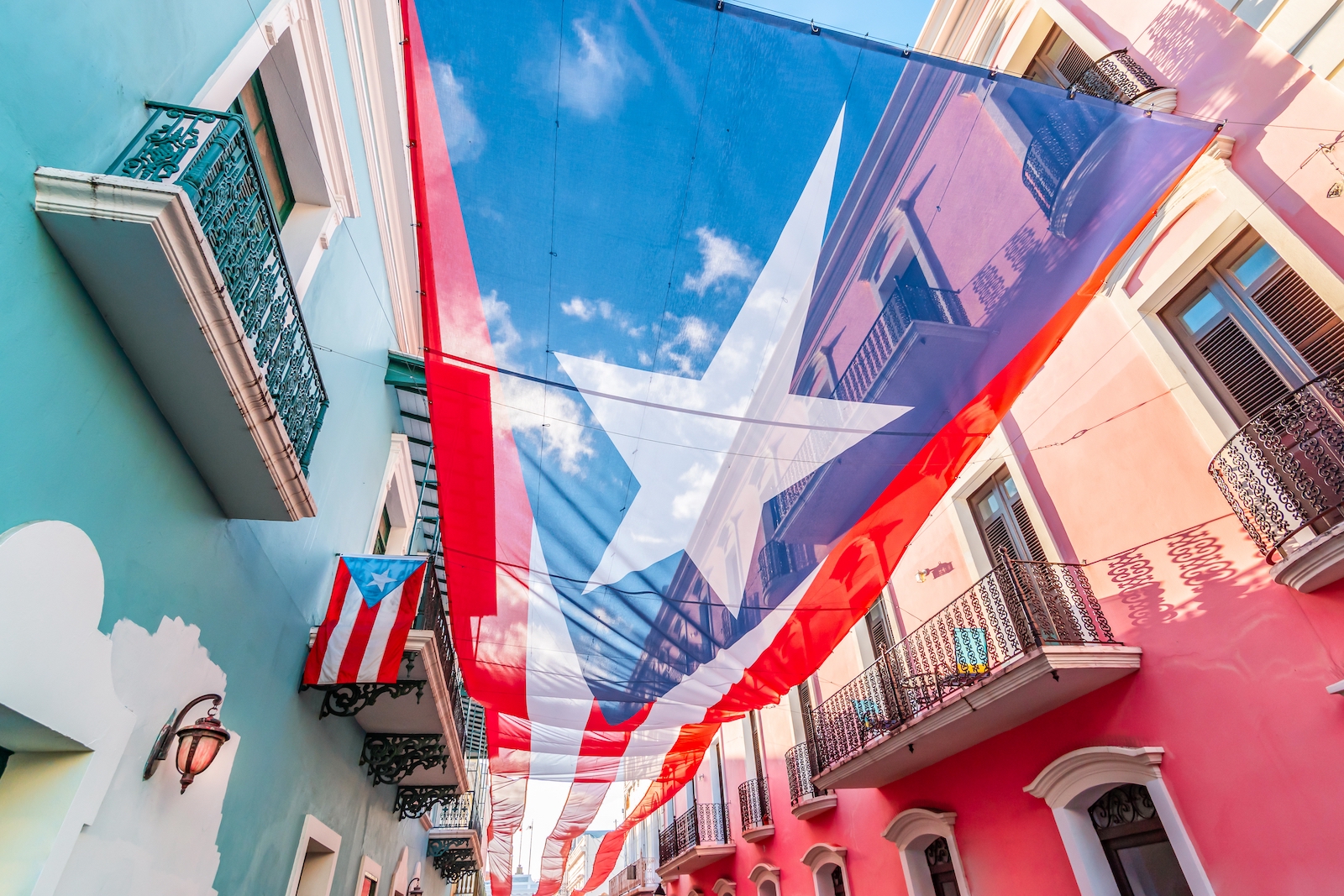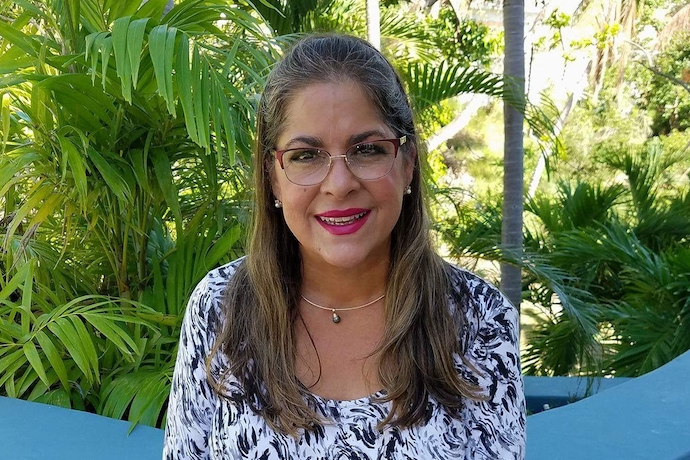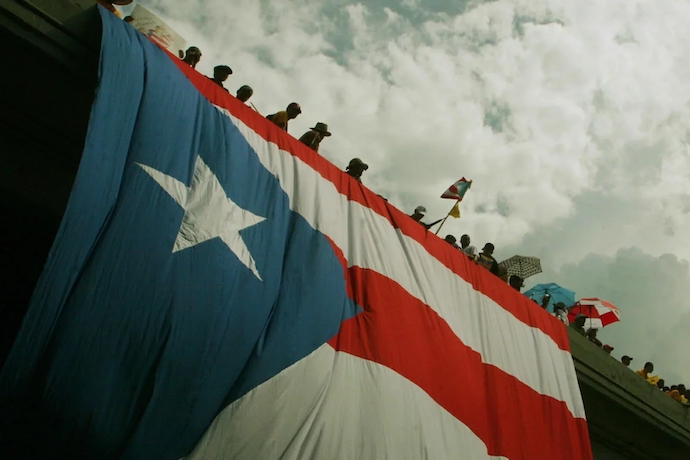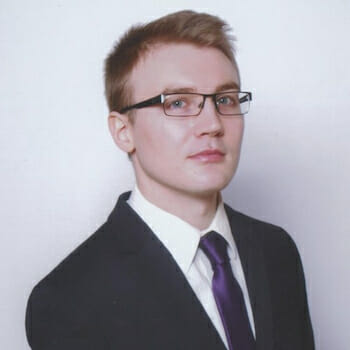
Eva Quiñones Segarra: A Voice for Secularism and Humanism in Puerto Rico
Eva Quiñones Segarra, a Río Grande resident, has long advocated secularism and humanist values in Puerto Rico. Her journey began at a Catholic school in Guaynabo, where she graduated in 1984 with a religion medal—despite her departure from faith years earlier. She went on to study agricultural sciences at the University of Puerto Rico at Mayagüez, specializing in livestock industries, before earning her Juris Doctor from the Interamerican University of Puerto Rico in 2001.
As one of Puerto Rico’s leading secular voices, Quiñones actively challenges legislation undermining the constitutionally mandated separation of church and state. Her advocacy extends across media platforms, including radio and television in Puerto Rico, the United States, and Peru, where she addresses public interest issues through a humanist lens.
Since joining Humanistas de Puerto Rico in 2011, Quiñones has become a key figure. She played a pivotal role in the first Regional Convention of American Atheists in Puerto Rico and has internationally represented the Puerto Rican secular community. At the heart of her work lies a deep connection between humanism and the promise of nuclear energy—a topic she champions to deliver reliable, sustainable power while advancing human development.
During our conversation, Eva Quiñones Segarra discusses the intersections of humanism, energy policy, and Puerto Rican cultural dynamics, offering a rare insight into the evolving landscape of secularism in Latin America.

Scott Douglas Jacobsen: You’ve drawn connections between humanism and nuclear energy. Can you outline your perspective? What makes nuclear energy a compelling solution from a humanist viewpoint?
Eva Quiñones: My pitch is that nuclear energy can power the entire planet because it provides energy 24/7. Many people worldwide do not have access to electricity and need it at night. Nuclear energy can help lift people out of poverty by providing reliable access to electricity, enabling them to enjoy the advantages we take for granted. As humanists, we must promote technologies that contribute to human well-being.
Many people still rely on cow dung or wood for heating and cooking. Nuclear energy can reduce the time spent on such basic tasks, allowing people to pursue other endeavors or work on different projects. For example, if a woman has a refrigerator, she doesn’t have to go to the market daily. This enables children to study at night and help their mothers during the day. Electricity is valuable because it supports access to more technologies, provided it is reliable and, ideally, affordable.
Another critical aspect of nuclear energy is that it does not rely on weather conditions. For example, in Puerto Rico, where I live in the Caribbean, the sun sets around 6 p.m., and wind generation often decreases in the evening, reducing energy output at night. Batteries, which are used as backups, pose environmental challenges due to the difficulty of recycling the materials they contain. If countries like China reduce their acceptance of electronic waste, recycling becomes even less feasible, making nuclear energy a preferable option.
Nuclear energy is nearly renewable in that while reactors need to be constructed, the fuel requirements are smaller than the extensive mining needed for renewable technologies. The U.S. and Canada do not control significant reserves of rare earth minerals needed for solar panels and batteries, so nuclear energy can contribute to energy independence in these regions. Additionally, mining operations for minerals like lithium, cobalt, and nickel often have poor environmental and human rights records, similar to blood diamonds concerns.
In this context, nuclear energy supports human flourishing in a way that can be better for humanity overall. I emphasize that solar panels and batteries, while beneficial, come with environmental and ethical drawbacks. My husband once laughed about this.
I present this general perspective when discussing the relationship between humanism and energy generation.
Jacobsen: High-profile disasters like Chernobyl and Fukushima have shaped public perceptions of nuclear power. How do modern reactors address these concerns? Are they significantly safer, or are advancements more incremental?
Quiñones: Chernobyl is an example of a reactor design that has been abandoned. Specific engineering and operational failures caused its catastrophic accident. Modern reactors incorporate advanced safety features and are much safer than past generations. We can undoubtedly discuss those improvements in more detail.
But yes, Chernobyl was a failure. However, and luckily for everyone in Europe, however, the fallout wasn’t as catastrophic as people think. One of the significant issues was that children who were developing had a slight increase in thyroid cancer, but it is primarily a treatable cancer and usually not lethal.
That concern ended decades ago. Fukushima, on the other hand, was not a nuclear disaster. It was caused by a massive tsunami following a huge earthquake, and the plant shut down as designed.
No one died in Fukushima due to nuclear fallout. People died because of the tsunami and the mass evacuations. Not a single death in Fukushima can be attributed to radiation. Not one. There is a popular meme, and many have seen NOAA images with red lines seemingly emanating from Japan, stretching to the United States and even down to Chile. But those are depictions of waves, not radiation.
There was no increase in radiation above toxic levels. Radiation is a natural part of our world. Eating a banana, flying on a plane, or having an X-ray all expose you to radiation. Some cities are naturally more radioactive than others.
In the case of nuclear energy, leftover radiation is enclosed and kept safe. For example, coal used to generate electricity is radioactive, and the ashes produced are also radioactive. These ashes are piled up and exposed to air and water, releasing more radiation than any currently active nuclear plant. There are many myths and misconceptions about radiation and nuclear energy, and I aim to dispel them because we need to approach this topic with facts.
Jacobsen: Bill Gates and others have advocated for new reactor technologies, such as salt-based designs. What potential do these innovations hold for a safer and more sustainable nuclear future?
Quiñones: The company is called Natrium, and it uses a sodium salt reactor. The heat transfer system is made of sodium salts, hence the name “Natrium,” which comes from “Na,” the symbol for sodium.
Unlike Canadian reactors, for example, which are water-cooled, these new reactors do not require a water source to cool them like most older designs. Instead, they use an enclosed sodium salt energy transfer system. This stable sodium salt enables these new reactors to shut down passively.
If they reach a specific temperature, you can walk away. The system will shut down and cool safely, preventing hazardous runaway reactions. These are known as fourth-generation reactors.
They have a passive shutdown system. You don’t need to press multiple buttons, pull levers, or monitor various metrics. The system shuts itself down and is cooled by molten or solid salts.

Jacobsen: How has humanism evolved in Puerto Rico, particularly in the context of political shifts and increasing evangelical influence? Are there developments that stand out post-election?
Quiñones: Puerto Rico currently has a new political party based on Christianity. This is its second election with numerous candidates, many of whom are evangelical pastors or affiliated with evangelical circles. The largest political party here is concerned because it is conservative and has been losing members to this new evangelical party. I predicted early on that this major blue party would start becoming more religious to retain evangelical Christians and their votes, and that’s precisely what has happened.
The other major party has also increased its religious rhetoric because it was losing voters to this new party. This strategy has caused the loss of voters. However, this new party has shifted from being strictly evangelical to the new Latin American Yight. It reflects a form of Latin American libertarianism that originated in Argentina, exemplified by their new president, Javier Milei, who is a libertarian.
You also see this trend with El Salvador’s president, Nayib Bukele. He’s known for building massive prisons and cracking down on gang violence. I’m sure you’ve heard about him. This Latin American libertarian movement is religiously influenced and far-right.
This strain of libertarianism is spreading through Latin America and has been promoted from Argentina. It’s a type of social experiment in the region, and Javier Milei is the most prominent figure right now. Jair Bolsonaro, Brazil’s former president, supported these libertarian ideas, though their success has been mixed so far.
I hope they succeed, not because I support those ideas, but because I don’t want people to suffer. Argentina is in a dire economic situation, and people are suffering. I don’t care how they escape that suffering, even though I am not a libertarian. However, I hope there is some success because things are difficult now, and Argentina has struggled for about 20 years. This is one part of my humanistic beliefs that I grapple with because, while I may have certain political and economic ideas, at the end of the day, I want people not to struggle and to have food, shelter, and electricity.
Should I care how they achieve that? It’s a big question. Do my beliefs, shaped by my Puerto Rican culture, transfer to other cultures? I struggle with that notion, but I want people to thrive, and there may be more than one universal path to achieving that.
My idealism says yes, but can my ideals truly be translated into these countries? Is the Internet enough to help transform these societies? I constantly struggle with these questions. Is it ethical or even possible to export these values? I know what my humanist ethics dictate and am clear on that.
However, reality is complicated, and I have traveled extensively and seen this complexity firsthand. Can you transfer your beliefs to another country? Can you transfer humanism? I must stay committed to my path, but it takes work.
Jacobsen: At international forums like the World Congress, unique voices from different cultures shine. Reflecting on your experiences meeting humanists from around the globe, what makes these moments so impactful?
Quiñones: I’m sad to say that humanism has been somewhat hijacked by the political far left, which is unfortunate because humanism, rooted in ethics, should transcend politics. Compassion, for example, is not inherently a right or left value. The left often views compassion as one of its core values, while the right believes it is compassionate.
Nuclear energy is an example—it’s not a right-or-left issue. Ensuring everyone has food or a culturally acceptable roof over their heads is not inherently political. Humanism, with its basis in ethics, science, and free thought, is particularly good at shaping the best ideas, which can come from either side of the political spectrum.
Latin America is growing; it’s not the profoundly impoverished region it was 30, 40, or 50 years ago. I have been to Chile, Peru, Colombia, and Venezuela and have seen the progress firsthand.
Mormons can be found in Bolivia, Peru, and even Costa Rica, where I have seen them with their badges and bicycles. So, we face similar challenges. Also, if you weren’t aware, Costa Rica is the only country in Latin America constitutionally Catholic, though not co-governed with the Vatican.
This is a unique characteristic. However, intense clashes between religion and the state don’t occur in Costa Rica. Catholicism has had to soften its stance to retain followers. I have humanist friends in Peru who have said that they don’t mind the Catholic Church caring for the Inca treasures. The church has competent historians and museum managers who preserve these artifacts well, perhaps better than the government might.
So, the Catholic Church is not always viewed as the primary opponent, except when it comes to prohibitions on issues like abortion, which often continue regardless. Latin America’s relationship with the Catholic Church is complex. The Catholic Church has had to adapt because of the new wave of evangelicals, who often have a mandate to influence government policy in specific ways. This presents a new struggle for the 21st century, which we discuss frequently.
Jacobsen: You’ve spoken about a friend’s conversion to Catholicism. How did you react when they shared this with you? What insights did that experience offer into the dynamics of belief and identity?
Quiñones: He called me specifically to tell me. I was taken aback, and the first thing I said was odd—it’s something you’ve probably never heard before.
I had to say that to myself at that moment because what I wanted to do was scream and insult him. I wanted to shout, “How can you believe this nonsense? Sky Daddy? What is going on?” I wondered if it was because he had a Catholic girlfriend and wanted to get married. I couldn’t even ask if she pressured him into this decision. But as soon as I told my husband and another friend, their immediate reaction was, “That’s a girlfriend move.” I thought, “No, he’s not stupid. He’s intelligent.”
It couldn’t be just that. What was he thinking? And this person was high up in my organization, too. I told him again, “Please don’t let me say anything that hurts you while we’re talking about this.” Then I said, “I feel like I’ve lost you.”
I haven’t shared this with many people, but I told someone else, and they said, “This is like if your son came out as gay.” I responded, “No, if my son were gay, he couldn’t help it, and I would love him regardless. That’s not even a question.” Being gay isn’t a choice; it’s inherent. But believing in the Catholic God is a choice, as much as you can choose to believe or not.
However, how much of a choice would it be if you were groomed in childhood? It’s a complex matter. This person went to church and mass on his own as a child and was more devout than most Catholics I knew. It made me think about the impact of being raised with such beliefs, which is why one of my main priorities has been advocating against religious indoctrination in public schools.
I even won a legal case related to this issue. I sued the Secretary of Education here in court because a public school was preaching to students and telling them their non-believing mother was an atheist. We won the case and reached a mediation agreement with the help of the Freedom From Religion Foundation and my local lawyer. The agreement stated that you cannot preach to other people’s children in a public school setting nor allow others to do so. It’s an excellent document, though it has yet to be enforced due to the disruptions caused by COVID and other subsequent events. It was a chaotic time.
A ruling in Puerto Rico mandates the separation of church and state in public schools. Christopher Columbus discovered Puerto Rico on his second voyage on October 12, 1493. But there were already people living there. Puerto Rico was inhabited by two indigenous groups believed to have come from South America: the Arawaks and the Caribes. The Arawaks were from the Amazon region of southern Venezuela.
When I visited the Amazon in 1997, I was taken to meet the Arawak people in Venezuela. It was fascinating because I tried to explain where I was from and that I, too, had Arawak ancestry. These interactions can be transformative.
Jacobsen: Growing up in Puerto Rico, how did religion shape your educational experience? Was it inclusive of diverse beliefs, or did it lean toward a more traditional approach?
Quiñones: When I was growing up, nobody talked about religion. Everyone was Catholic, but it was rarely discussed. There was a church in my community, and many people attended. I even went a couple of times with friends because it was part of the routine, or just tradition, to go on Sundays. But outside of that, no one spoke about religion, dogma, or religious beliefs.
In my house, we talked about it even less. One Puerto Rican tradition is that when you visit older relatives, you ask for a blessing. You’d say, “Bendición,” and they would respond, “Dios te bendiga.” But even then, it wasn’t seen as religious; it was more of a cultural tradition. I know many atheists who still ask for blessings. It means saying, “Hello, you’re special to me.” But in my family, we didn’t even do that—not even that.
Have you heard of the Wedge Document when evangelicals tightened their influence?
Jacobsen: Yes, 100%.
Quiñones: The Wedge Document was essentially the blueprint for evangelical strategy. It was about aggressively asserting their presence in society and positioning people in power. That document came out in the late 1980s or early 1990s, and I saw the changes unfold in real time. I started hearing about evangelicals visiting communities and recruiting people.
Evangelical churches are very different from the Catholic Church because they are unstructured. Anyone can become a pastor, start a small church in their home, and collect tithes for livelihood. The Catholic Church doesn’t operate that way. It has a hierarchical structure and requires years of training to become a priest. Evangelical movements don’t have a centralized authority dictating doctrine or practices. This allows anyone to pick up a Bible, grab a microphone, stand on a makeshift pulpit, preach, and ask for donations.
Evangelicalism is almost liberating because it allows for varied beliefs. However, questioning it is difficult because one doesn’t want to hurt someone’s religious convictions. Evangelicals are different from Catholics in many significant ways.
After 1898, when Puerto Rico became a U.S. territory following a military victory, the U.S. Army divided the island among various major U.S. religious groups to assist with education, healthcare, and community services. The northwest was given to the Catholic Church, the southeast to the Presbyterians, San Juan to the Baptists, and so on. Congregationalists and Mormons were also assigned areas, particularly in the central part of the island. The names of hospitals and institutions reflect this history—Presbyterian Hospital, Baptist Hospital, Mennonite Hospital, etc.
This division of the island by religious groups is unusual and unheard of, but it’s how it was done. For example, the big missionary drives included efforts to treat children with parasites by distributing castor oil to kill internal parasites. Different religious groups managed these health initiatives according to their assigned regions.
Puerto Rico’s religious landscape was predominantly Catholic, but people were curious about other faiths. I don’t think the Lutherans were given any part of the island. The Lutheran Church in the U.S. is huge and significant. However, I don’t think any of the six or seven regions the island was divided into were given to the Lutheran Church. Was there a specific reason for that, or did it happen accidentally? I am still trying to figure out why.
It’s an interesting question. If everyone else was getting a share of the responsibility—getting a “piece of the pie,” so to speak—it’s odd that they weren’t included. That said, the various religious groups helped the U.S. military significantly, and there were benefits to it. If your child had intestinal parasites, you wouldn’t care who provided the medicine to treat them or who offered them a desk in a small countryside school where they could learn.
Why did it matter who was helping? Only a little preaching was involved; it was more about providing help. That is a net positive. Puerto Rico was poor, and these efforts made a significant difference.
We also faced severe hurricanes in the late 1890s and early 20th century. Massive hurricanes caused widespread devastation and increased poverty until the 1920s and 1930s. We didn’t experience another life-altering hurricane until María in 2017. For many years, we didn’t face hurricanes of that magnitude.
However, during that earlier period, the churches played a role in helping organize people and bringing them into the modern age. We can be thankful for that; why not? They were helping, and their actions mattered more than their preaching.
Jacobsen: You’re speaking more to a philosophy of humanism, focusing on what people do rather than what they say.
Quiñones: Exactly. And that was over 100 years ago. We can do better now, of course, but at the time, it wasn’t about preaching—it was about the people sent to help. Think of it as a version of the Peace Corps. These groups included nurses and doctors who were needed. It was, in many ways, like the Peace Corps. I hope this comparison helps make sense of it, even if it doesn’t resonate with everyone. Puerto Rico was poor and largely rural.
Jacobsen: Given Puerto Rico’s history of poverty, religious influence, and gradual development, how did humanism take root in such a context? What has been the movement’s greatest challenge and success?
Quiñones: Because we have the Internet.
Jacobsen: Good answer.
Quiñones: Modern humanism in Puerto Rico, in many ways, arose from online access. We even have a Muslim community.
Jacobsen: Really?
Quiñones: Yes, and they don’t particularly like me. We have debates sometimes. One Muslim invited me to have coffee with him to explain Islam. I thought, “Okay, let’s do this differently. I’ll meet you at your mosque, we’ll sit in front of everyone, and women should be allowed to be present while we talk.” His response was, “No, no, no. They cannot do that.” That made it difficult for me to agree to sit down with him for a coffee while he tried to preach to me.
Another big issue is giving women equal footing. I insist that everyone should be present, without exception.
Jacobsen: And how do they respond to that?
Quiñones: They often dismiss it. “Why would I talk to a mere woman like you? What’s the point? Do you want me to put you in your place?” they imply. I responded, “If you want to do that, send me a private message. We don’t need to have coffee.” But no, for me, it’s about humanism, not feminism.
Some people might say, “It’s because you’re a feminist,” but my response is, “No, I’m a humanist. Women are humans.” We all share the same flaws and strengths.
Jacobsen: Thank you for the opportunity and your time, Eva.

